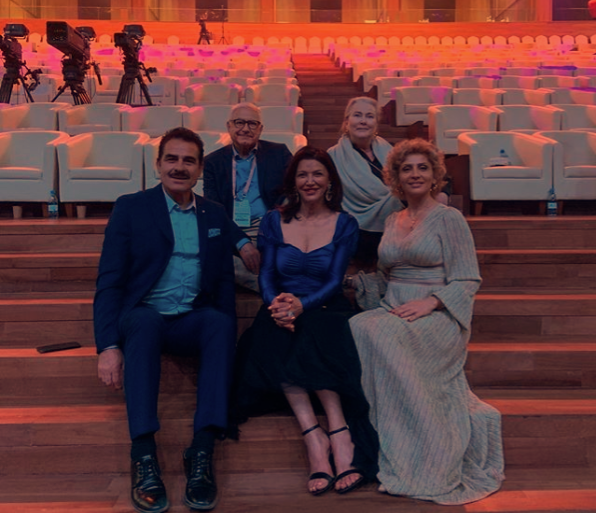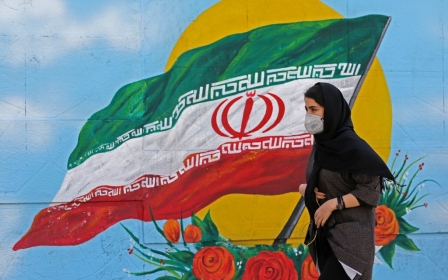Backlash in Iran after singers perform at Saudi Arabia festival

There was music legend Lionel Richie and Greek composer Yanni and Italian opera star Andrea Bocelli. And then, out of the winter desert in Saudi Arabia, the Iranian singers took to the stage.
Their performance in early March took place at Tantora, the cultural festival held among the ancient ruins in the northwestern town of Al-Ula since 2018 under the guidance of Crown Prince Mohammed bin Salman.
Along with cracking down on dissidents and rivals, leading the kingdom into Yemen’s war and attempting to diversify away from oil, the young prince has also been promoting Saudi Arabia as a tourism and entertainment destination.
'Those singers forgot their nationalism and embraced bin Salman for a few dollars'
- Maysam, an Iranian-Arab working in Tehran's Grand Bazaar
This includes public events that would have been unthinkable in the kingdom until recently, including women's professional wrestling, Halloween celebrations and performances from musicians who once would have triggered Saudi's morality police.
Stay informed with MEE's newsletters
Sign up to get the latest alerts, insights and analysis, starting with Turkey Unpacked
“Those singers forgot their nationalism and embraced bin Salman for a few dollars,” Maysam, an Iranian-Arab working in Tehran's Grand Bazaar, told Middle East Eye this week.
“I think this new thing is a behind-the-curtain plan, which is probably establishing a new base for concerts instead of Dubai.”
One of those who performed at Tantora was the singer Ebi. Saeed Shariati, a prominent reformist, tweeted that he had many happy memories of songs by the singer - but as far as he was concerned now, the star might as well be dead.
“He unfortunately passed away in Jeddah yesterday. Rest in peace. The [one under the guise of Ebi] is just an entertainer at the service of bin Salman.”
Some Iranians are also asking whether the two-day performance is only the beginning of a wider plan for the kingdom, which has established fresh Iranian media outlets in recent years, to revamp its reputation among Iranians.
Saudi investment in Iranian media
After Iran’s Islamic revolution in 1979, several popular singers - including those who performed in Tantora - immigrated to US, assuming they would face restrictions and bans from the incoming authorities.
They were right, although gradually the strict measures against musicians relaxed towards the end of the 1990s. During the past two decades, Iranian musicians have been free to hold concerts across the country.
The Saudi TV station Al-Arabiya reported that the self-exiled singers had been invited as part of the kingdom’s “focus on recognising Al-Ula as a cradle of diverse civilisations and cultures” and establishing the festival as “a bridge for cultural dialogue, ideas exchange and transmission of culture”.
But their performance comes as Saudi media outlets try to tap into the Iranian market.
The Saudi-funded satellite channel MBC Persia, for example, launched a talent show this year to attract more Iranian viewers and gain influence over Iran’s population.
As well as Ebi, the show also features Arash, another singer who performed at Tantora, and Mahnaz Afshar, a famous Iranian actress.
Mohammed bin Salman is also, according to a source who spoke with the Guardian, a force behind Iran International, a London-based news outlet which opened in 2017 and has become a platform for Iranian dissidents.
Iran International gave extensive coverage to the singers’ performances at Tantora, sending correspondent Pantea Modiri to cover the festival. Modiri has also repeatedly interviewed Reza Pahlavi, the son of Iran’s former shah, Mohammed Reza Pahlavi. His profile has been raised in recent years, with increased appearances and media coverage alongside the Trump administration's strategy of maximum pressure against the country. Even so, Pahlavi lacks legitimacy among many dissidents.
Some Iranian opposition figures have suggested that the concert at Tantora was the work of dissidents linked to Pahlavi. Shahram Homayoun, owner of US-based Persian satellite TV station Channel One, posted a video in which he said that Shahriar Aahi, the spokesperson for the Iran Transition Council, a US-based Iranian opposition group and considered to be in Reza Pahlavi’s inner circle, was behind the event. He shared a photo of Aahi behind the scenes at the concert hall in Al-Ula.
MEE emailed the Iran Transition Council, seeking comment from Aahi about whether he was involved in the concert. It did not receive a response at the time of publication.
'Great shifts in Saudi Arabia'
The performance at Tantora was held while several senior Saudi princes in the kingdom were arrested as the crown prince further consolidated his power. During his performance, Ebi praised what he describes as “great shifts happening in Saudi Arabia".
But other Iranians aren’t so convinced. Parham Ghobadi, an Iranian journalist at BBC Persian, tweeted an ironic list that he titled “great shifts in Saudi Arabia”, including the bombing of Yemen, jailing women’s rights activists and using an anti-terrorism court to silence activists.
'This is somehow a protest by the singers against Iran and a demonstration of support for bin Salman's social reforms'
- Fereidoun Majlesi, former Iranian diplomat
Hassan Ansari, a member of the US-based Institute for Advanced Study, wrote on his Telegram channel that he had watched Iran International’s coverage of Tantoura and wanted to offer alternative programming ideas.
“This is my suggestion to them: start a show on Saudi’s few years of bombing Yemen and killing its people and children and attacking hospitals and cultural heritage [sites] and the destruction of Yemen's libraries and civilisation and cultural legacies in the most cruel way possible,” he said.
Fereidoun Majlesi, who served as an Iranian diplomat before the 1979 revolution, told MEE he believes that the performance was an attempt by Riyadh to improve its image among Iranians, but one that will ultimately fail.
“Iranians are very suspicious of Saudi Arabia’s Wahhabism and therefore such pretentious actions simply won’t pay off,” he said.
“The goal of Saudi is not important for the singers, and they don’t care what is the current status of ties between Tehran and Riyadh as they will eventually get paid. This is somehow a protest by the singers against Iran and a demonstration of support for bin Salman's social reforms.”
Middle East Eye delivers independent and unrivalled coverage and analysis of the Middle East, North Africa and beyond. To learn more about republishing this content and the associated fees, please fill out this form. More about MEE can be found here.






